Current Activities within the Project
PhD successfully completed – An insight into to the work of Julia Tschersich
PhD successfully completed – Highlights from the research of Anoush Ficiciyan
Lea Kliem at the Organic Seed Growers Conference
Looking Forward to MASIPAG visit
RS & EGON at ESP 10 World Conference
South-North-Exchange – WS in the Philippines
General Information on the Project
On July 14, 2021, Julia Tschersich, research associate in the RightSeeds project, successfully defended her dissertation and graduated with the highest grade ‘Summa cum Laude’ (excellent). In her cumulative dissertation, she investigated the scope of seed commons initiatives with regard to the complex multi-level governance regime around biodiversity, intellectual property rights and marketing rules of varieties, as well as the potential of these initiatives to contribute to a socio-ecological transformation of agriculture.
An overview of the work and methodology is provided in the introductory chapter, available on ResearchGate: https://bit.ly/2XmumEF
To this end, in collaboration with Stefanie Sievers-Glotzbach, she first developed a conceptualization of a social-ecological transformation based on a literature review, which allows assessing the contribution of smaller initiatives and processes of change to a larger transformation. The proposed conceptual framework also helps to combine the strengths of different transformation and transition approaches.
The Social-Ecological Transformation Framework was published in the article ‘Overcoming the process-structure divide in conceptions of Social-Ecological Transformation: assessing the transformative character and impact of change processes’ in the scientific journal Ecological Economics: https://doi.org/10.1016/j.ecolecon.2019.106361 (Open Access).
In an extensive transdisciplinary process, she and the RightSeeds team also developed a concept for ‘seed commons’ that highlights common criteria of different seed commons initiatives. According to this concept, seed commons are characterized by the recognition of a collective responsibility for the conservation and further development of crops and genetic diversity, by the protection against the appropriation of seeds by private property rights or (bio-) technological breeding methods, by collective, polycentric structures, and by the sharing of knowledge. These criteria are suitable to stringently analyze and highlight the common challenges and opportunities of such seed commons initiatives.
The second article ‘Diverse Seeds – Shared Practices: Conceptualizing Seed Commons. International Journal of the Commons’ of the cumulative promotion is published in the International Journal of the Commons: http://doi.org/10.5334/ijc.1043 (Open Access).
Julia Tschersich next used the seed commons criteria to systematically examine how the complexity of the multi-level governance regime around seeds, biodiversity, and intellectual property rights affects seed commons initiatives. The analysis highlights the conflicts of norms and rules between the biodiversity and property rights regimes at the international level, and analyzes how these norms interact in the rules governing seed regulation at the national level. It is shown that the patent and plant variety protection regimes in particular, as well as strict requirements on seed commercialization, can pose a risk of criminalizing key practices such as seed sharing or seed adaptation in the field. However, the impact of norms, such as biodiversity conservation or farmers’ rights under the Convention on Biological Diversity and the International Seed Treaty, also contribute to new exceptions and thus expanded scopes of action for seed commons.
The article ‘Norm conflicts as governance challenges for seed commons: Comparing cases from Germany and the Philippines’ is available at Earth System Governance: https://doi.org/10.1016/j.esg.2021.100097 (Open Access).
Finally, it is shown that seed commons initiatives can creatively, differentially and consciously deal with existing frameworks, resist them as well as exploit grey areas, and thus contribute to institutional and political change through their alternative, everyday social practices. By challenging existing practices, rules, and norms and creating a real and viable alternative, they can challenge existing structures.
Overall, the work uses the example of seed commons initiatives to show that even small-scale initiatives can contribute to socio-ecological transformation if they challenge prevailing structures, institutions, and paradigms and create equitable and resilient alternatives.
On the 19th of May 2020, the time had finally come and after 3.5 years my doctoral thesis was nearing its end. I can still remember my beginning and how proud I was to have been selected as a member of the” RightSeeds” Junior Research Group.
This thesis would not have been possible without the inspiration and support of a number of wonderful individuals — my thanks and appreciation to all of them for being part of this journey and making this thesis possible.
First and foremost, I wish to express my sincere appreciation to my first supervisor Prof. Teja Tscharntke (Agroecology, University of Goettingen) for his guidance, encouragement and advices he has provided me throughout my complete time as his doctoral student. The same appreciation is true for my second supervisor Prof. Jacqueline Loos (Sustainable use of natural resources, University of Lueneburg), who took the role as my mentor from my first day as a doctoral student on. Through her very good scientific support and continuous optimism she has always been a role model for me.
But none of this would have been possible without my third supervisor Prof. Stefanie Sievers-Glotzbach (Economy of the commons, University of Oldenburg) who is the main creator of the “RightSeeds“ Project, in which my thesis is embedded in. I am sincerely grateful for her trust in me as a member of the team. Together with my “RightSeeds” team members Julia, Lea, Nina and Nils we experienced the ups and downs of a new project start, the share of happiness of success, depression of greenness and the warm and inspiriting sun on the Philippines.

In the following I’m happy to share some results and highlights from my thesis with you!
Within the RightSeeds project, my research contributed to the agroecological perspective on organic and traditional seeds and varieties. My doctoral thesis consists of a literature review entitled „More than yield. Ecosystem services of traditional versus modern crop varieties revisited”(published), and field experiments with organic and conventional crop varieties and species mixtures under stress. The manuscripts for the experiments are currently being prepared (manuscript mixed cropping 2018) or submitted (manuscript drought stress 2017).
Insights into the field season 2017
Similar Yield Benefits of Hybrid, Organic, and Conventional Tomato and Pepper Varieties in Optimal and Drought Conditions
We tested yield performance of five hybrid, five organic and five conventional varieties of tomato and pepper in a common garden experiment under optimal and drought conditions.
- Fruit weight and fruit number were lower under drought stress for hybrid, organic and conventional tomato and pepper varieties.
- Hybrids produced more individual fruits than organic or conventional varieties.
- A wide range of varieties appears to be pivotal for crop production under drought and increasing incidences of climate extremes.
Insights into the field season 2018
Better Performance of Organic than Conventional Tomato Varieties in Single and Mixed-cropping
- In mixed-cropping with a bean, organic tomato varieties produced highest yield and best fruit quality compared to conventional varieties.
- Under weed pressure in single plantings, organic varieties showed higher fruit weight stability compared to conventional varieties.
- Organic breeding resulted in competitive, good performing varieties, which may even outperform conventional varieties.
- There is need to maintain and restore a diverse portfolio of varieties and diversified mixed-cropping systems to counteract the current loss of functional agrobiodiversity.

Author: Anoush Ficiciyan
This February, RightSeeds team member Lea Kliem visited the Organic Seed Growers Conference in Corvallis, Oregon. This event is organized by the Organic Seed Alliance every two years and brings together the entire North American organic seed community. The attending breeders, seed multipliers and scientists had the opportunity to attend workshops on topics like “Seed Ownership and Seed Commons”, where various commons-approaches were discussed in the context of North American property rights. The 5th anniversary of the American Open Source Seeds Pledge was celebrated as well and on this occasion, the practical implications of open source seed initiatives worldwide were discussed. In addition, the conference focused on Community Seed Stewardship, Participatory Plant Breeding and Seed Sovereignty.


Our RightSeeds colleagues Nina Gmeiner and Lea Kliem took part in the winter meeting of the Kultursaat e.V. initiative group for vegetable seeds. The practice partners, who visited the partner organisation MASIPAG together with the RightSeeds-Team in February, were able to share their experiences. In addition, the RightSeeds team gave an outlook on the visit of the MASIPAG representatives in summer 2020 in Germany. They were pleased about the active interest in an exchange in the coming summer.

On 22nd October young scientists from RightSeeds and EGON presented their research at the 10th Ecosystem Services Partnership (ESP) World Conference in Hannover. The presentations were given in the session on “Agroecology: Managing biodiversity and soil health for the sustained provision of ecosystem services in agriculture” and subsequently, the topics were discussed with the participants. In the morning Anoush Ficiciyan (RightSeeds) presented the results of her publication “More than yield: Ecosystem services of traditional versus modern crop varieties revisited”. In the afternoon, Lea Kliem (RightSeeds) spoke on “Seeds of resilience: The contribution of commons-based plant breeding and seed production to social-ecological resilience of the agricultural sector”. After the lecture, Hendrik Wolter (EGON) presented commons-based approaches in the fruit sector under the title “Improving the resilience of fruit cultivation with commons-based organic fruit breeding”.
At the beginning of February 2019, the RightSeeds research team travelled to the Philippine island of Luzon, more precisely in Rajal Centro, Santa Rosa, Nueva Ecija, accompanied by German practice partners. Together with the Philippine network MASIPAG (Farmer-Scientist Partnership for Development) they conducted a six-day workshop and discussed about common goals, visions and wishes for the future, the different economic and legal framework conditions as well as the daily practical work of the breeders. The exchange with MASIPAG coordinators, breeders and farmers provided the German partners with valuable insights into an organization in which diversity of plant varieties and food sovereignty are central values. For decades, MASIPAG has stood for a successful cooperation between breeding, crop cultivation, science and NGOs.
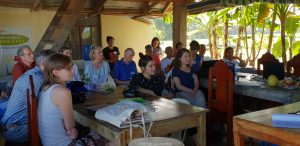
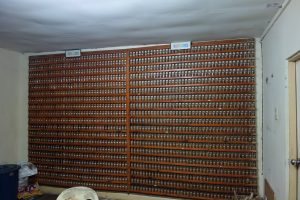
MASIPAG has been living the common property principles investigated in the project for decades and has thus been able to share valuable experience. In turn, the German practice partners provided the Philippine partners with important insights into breeding work in Germany. The workshop week was divided into different focus topics. After a kick-off day including a visit to the MASIPAG backup farm, the next day was dedicated to vegetables and onions (blog post about the vegetables and onions day). The workshop day on rice included a visit to the Philippine Rice Research Institute and for the “policy day” talks in the Ministry and in the Office Provincial Agriculturalist were scheduled (blog post on the rice and policy day). Another day was dedicated to conceptual work on commons and a reflection of the workshop week as well as general feedback on the south-north exchange.
Currently the results of the Philippine trip are evaluated by RightSeeds and in parallel the planning of a visit of the MASIPAG delegation in 2020 is progressing.
Rough experimental design: Comparison of the yield quantity and quality of organic and conventional tomato and bean varieties under weed pressure. Cultivation as a bean-tomato mixed crop (in PE mortar tubs) and as individual plants (in pots) for comparison.
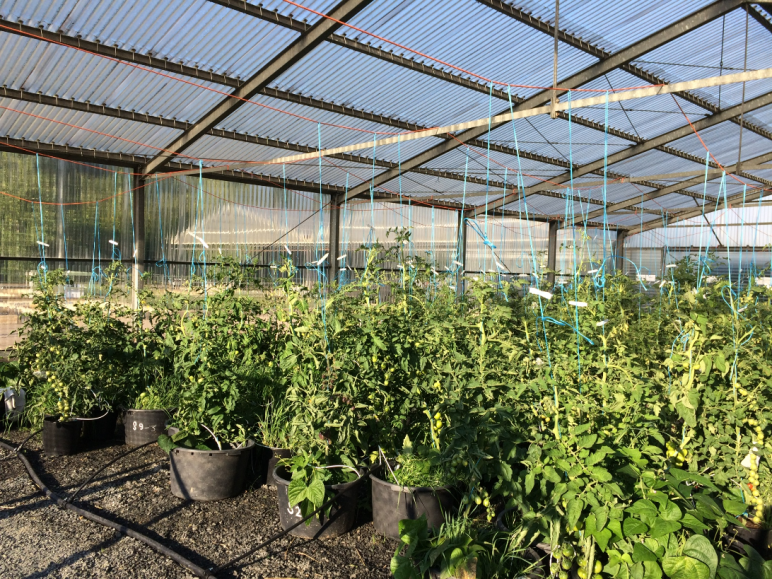
October 2018, autumn has finally arrived here in Göttingen and I left my plants last week with a heavy heart. For almost 6 months my almost 400 “children” were an integral part of my daily work and in my thoughts when I was not here.
Despite the very hot weather, almost all beans and tomatoes did well. The harvest season started this year on 19 June with the first beans. The harvest went really well for 6 weeks, until suddenly the spider mite pressure became too strong. After these 6 weeks, the first tomatoes ripened quite fast and I stopped with the bean harvest, because they became weaker and weaker quite fast due to the mites. However, the good weather and the hot days made sure that the tomatoes ripened quickly and felt comfortable with sufficient irrigation. Nevertheless, I also noticed that the very hot days this summer have also stressed my plants extremely and the harvest in the two extreme weeks was noticeably worse. In order to spare the plants after this extreme time, I almost completely stopped pinching and pruning them from September on and only occasionally made sure that the plants kept a structure where you can harvest well. In my opinion this has done the plants a lot of good, they have recovered well and have started again full of energy. My experience is that pinching and pruning is often used to its fullest among hobby gardeners, but it is probably good for the plants (like all other living beings) if you just leave them alone and do not always cut something off “here and there”.
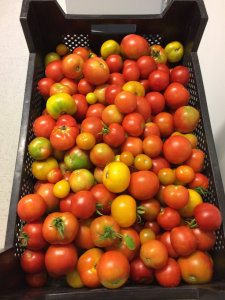
Overall, I harvested in the entire harvest period:
13.905 green beans (78 kg)
and 13,601 tomatoes (643 kg)
The exact composition of the harvest – whether there were differences between the organic and conventional variety groups and how the mixed cultivation of bean and tomato plants in a tub had an effect on the harvest and quality of the fruit – remains interesting and will be shown in detail in the statistical evaluation, which is still to be carried out.
Finally, I would like to thank all the lovely people who have accompanied and supported me in advance and over the last few months with their expertise, muscle power and creativity. Without the gardeners in the new Botanical Garden here in Göttingen and my student colleagues I would certainly not have become such a proud mother of plants!
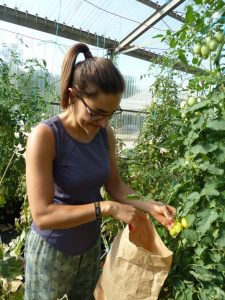
From June 6th to 8th 2018, 30 scientists from more than ten different countries met in Oldenburg, Northern Germany, to discuss the sustainable and viable management of New Commons.
In four different sessions of the workshop “Conceptualizing the New Commons – The Examples of Knowledge Commons & Seed and Variety Commons”, the participants debated about the challenges of creating and managing New Commons. These Commons arise from social, political and economic processes and to manage them, it is necessary to find a way through the complex regulations and statutes which determine the respective fields of action (i.e. seeds and varieties; knowledge) and to establish local structures.
One highlight of the workshop was undoubtedly the public keynote speech of Jack Kloppenburg, professor at the University of Wisconsin and co-founder of the Open Source Seed Initiative, about Enacting the New Commons in the ambience of the beautiful reading pavilion in Oldenburg’s castle garden. Afterwards, the participants were invited to get to know each other a little more and/or simply to continue discussing about workshop contents at a joint conference dinner at the nearby restaurant Ratskeller. The next highlight followed right in the morning after: The keynote speech of Brett Frischmann, professor at the Charles Widger School of Law at Villanova University with the topic Governance of Knowledge Commons – Conceptualization and Remaining Challenges. The second workshop day found its end in a city tour through and around the city center of Oldenburg. Like the day before, day three also began with a remarkably interesting speech of keynote speaker Silke Helfrich, author and scientist at the Commons Institut with the headline Beyond the Familiar Categories for Understanding Commons. In a last joint closing session, the participants got the chance to give feedback and reflect about their workshop experience.
During the three days, several scientists teamed up to write a joint paper which is a great tool to scientifically putting the results of the workshop on record.
Finally, the cooperation between the International Association for the Study of the Commons (IASC) and the group of Early Stage Researchers of the RightSeeds project to set up this workshop led to very satisfying results with plenty of positive feedback from the participants.
Seeds and varieties form the basis of agricultural crop production. The structures of seed production and plant breeding have a decisive impact on our global food system, whose greatest challenge is to ensure food security for a growing world population. Since the 1940s, previous approaches to solving this problem have focused primarily on intensifying agriculture. The aim was to increase crop yields by breeding high-performance varieties. However, these varieties usually require large quantities of synthetic chemical fertilizers and pesticides for cultivation.
The concentration of breeding efforts on a few, economically attractive crop species and varieties means that these varieties have a high presence in agriculture. Their large-scale, industrial cultivation contributes to a decline in biodiversity as well as regulatory and cultural agroecosystem services. This is particularly problematic against the background of the need for future adaptability to climate change and has a particularly negative impact on the rural population of the global South.
Agrobiodiversity is an important prerequisite for long-term stability of agricultural yields. Besides the adaptability of crop varieties to changing environmental conditions, agrobiodiversity has a positive influence on the natural regulation of plant pests and the effectiveness of insect pollination. The conservation of agrobiodiversity thus becomes a very important component of an environmentally sound farming system.
The current structures of variety breeding and seed production are not only associated with ecological problems. For farmers and gardeners, the development described above is often associated with the restriction of their rights to free access to seed, the so-called “Farmers’ Rights”. Farmers worldwide are therefore calling for the technical target variable of food security to be replaced by the political demand for a self-determined and democratic food sovereignty, which includes the right of access to seeds and plant genetic resources.
Two main developments can be identified as the cause of the described interdependencies:
an increasing market concentration in the seed and agrochemical sector: The supply on the international seed market is currently determined to a large extent by 10 leading seed producers (cumulative market share 75%). The three largest companies have a market share of 53 %.
the extension of the scope of private property rights to seeds and varieties. From an economic perspective, seeds are fundamentally not a scarce commodity, as they are self-reproducing and therefore available in large quantities. It only became economically interesting as a product when legal and technical mechanisms were created to protect seeds and varieties from reproduction by third parties. This possibility of exclusion of use provided incentives for private sector investment in innovative breeding. The plant breeding methods used in this context include in particular the development of hybrid seeds that cannot be reproduced.
The availability of the legal and technical mechanisms described above has produced a system of plant breeding and seed production that applies its innovative power primarily to varieties with high economic yield expectations. This is accompanied by negative external effects: Among other things, the concentration of breeding efforts on a small number of high-yielding varieties worldwide leads to a reduction in variety diversity and thus influences a key component of agrobiodiversity. In the global North, only hybrid varieties of some species (e.g. tomato, cauliflower) are available for the most part. This is a major challenge for organic crop production and consumer interests.
In Germany, moreover, the strict approval criteria and complex approval procedures for varieties restrict the market launch of new breeds. The narrow interpretation of seed and variety law and the criteria for variety approval leave breeders little scope for developing less uniform varieties that can be reproduced. They lead to a “lock-in” effect for the availability of new varieties in legal, institutional and plant genetic resources. This development is in conflict with the core objectives of a future-oriented, socio-ecologically sustainable food system. The regulatory framework does not provide any significant incentives for the conservation of agrobiodiversity, the guarantee of food security and sovereignty, and the provision of a wide range of agro-ecosystem services.
Seeds and varieties as common goods form a “second path” alongside the seed system under private property law, in order to increase the scope for action.
For the following four years, the junior research group “RightSeeds” will investigate the potential of Commons-based seed and variety systems to promote sustainability goals.
Backround
Especially in countries of the Global South, Commons-based approaches such as seed exchange systems, community seed banks and participatory plant breeding are successfully practiced. More recently, seed initiatives in the context of organic plant breeding in Germany have emerged that are starting to integrate principles of Commons in their work.
Objectives
The research project´s goal is to explore the transformative potential of Commons-based seed systems for a social-ecological plant cultivation and how this potential can be enhanced. Therefore, the functioning and context factors of actors employing this alternative approach to variety breeding and seed production are assessed both from theoretical and practical perspectives. Moreover, promising breeding approaches, business models, communication and governance strategies are to be developed for the participating seed initiatives. Moreover, the project aims at initiating learning processes between Commons-based seed initiatives at the national and international level.
RightSeeds is a collaborative research project by the Department for Economics at the Carl von Ossietzky Universität Oldenburg, the Institute for Ecological Economy Research (IÖW) and the Agroecology group at Georg-August-Universität Göttingen.
Integrating perspectives from ecology, economics, political science and ethics, as well as collaborating with German and Philippine seed stakeholders, RightSeeds follows an interdisciplinary and transdisciplinary approach. At the Carl-von-Ossietzky University Oldenburg, the philosophical and institutional economics analyses are centered: The former addresses how Commons-based seed systems enable actors to personal well-being by supporting capabilities. The latter addresses how institutions in the multi-level governance system affect Commons-based seed and variety initiatives and how they can enlarge their scope for action. The Institute for Ecological Economics Research investigates the organizational structures of social entrepreneurs and their role for the provision of common goods. Additionally, field experiments with vegetable varieties will be carried out by the Agroecology group of the Universität Göttingen.
Central actors in the fields of organic plant breeding, seed production, distribution and marketing constitute the practical partners in the German-speaking context (Kultursaat e.V., Saat:gut e.V., Bingenheimer Saatgut AG, tegut, Bundesverband Naturkost Naturwaren). Other partners are AGRECOL e.V., an association that works at the interface between science and practice for the establishment of seeds as common goods; Arche Noah e.V, engaging for the preservation of crop diversity also on a political level, and MASIPAG in the Philippines, which is a network of 35.000 rice grower families, scientists and NGOs. The practical partners’ integration is implemented by initiating, monitoring/mentoring and South-North exchanges, regular focus groups and workshops, interviews, as well as joint field experiments.
With the intensification in the agricultural sector, a commercialized, privatized and more and more monopolized system of plant breeding and seed production has developed: It focuses on a narrow spectrum of high yield varieties for the industrial agriculture and therefore contributes substantially to the worldwide loss of cultivated crop plant variety. The Commons-based variety breeding and seed production presents an approach to counteract genetical erosion of crop plant variety and thus promotes food sovereignty.
Until the beginning of the 20th century, seeds were a resource that was exchanged by farmers as a common good and was therefore propagated and used in the common interest. A wide variety of varieties were preserved in regular replication and was further developed in the fields if necessary. Today this has changed. A change in the legal framework for breeding and seed production has created the option of protecting varieties by property rights. This was accompanied by the development of technical processes to limit the ability of varieties to be copied. These changes made economic yields possible for which the natural characteristics of seeds and varieties had previously provided no basis. There were now framework conditions and procedures for transferring varieties and seeds from a common property to the status of a private property.
As a result of private-sector investment in breeding, high increases in yields were achieved for varieties whose (mostly large scale) cultivation must be accompanied by intensive crop protection measures. The dynamics of the market for seeds and varieties is now characterized by a strong market concentration on a few large suppliers. In this market constellation, the breeding objectives are concentrated on a decreasing number of high-performance varieties. As a consequence, serious problems arise from a sustainability perspective with regard to the loss of variety diversity, agrobiodiversity, adaptability to climate change and food sovereignty.
Our research addresses the question to what extent community-based rights to seeds and varieties can contribute to solving these problems in crop production. How can a “second way” alongside private-sector practice create a counterweight to the one-sided orientation?
What we do
To answer these questions, it is first important to clarify what exactly it means to treat seeds and varieties as common goods. Through close cooperation with our practice partners, we learn how the concept of common property is already being used as a viable form of organization through initiatives, networks and socially oriented companies. We closely link the scientific perspective with the requirements of practical feasibility and possible scope. In addition to looking at the practical side, we examine the political and legal framework conditions that are decisive for the scope of action of public good-based initiatives.
In the RightSeeds project, we are investigating both organizational forms of community-based variety breeding and seed production as well as the framework conditions relevant to this work. A comparative look at initiatives and networks in the northern and southern hemispheres is particularly interesting here: The exchange with the Philippine network MASIPAG gives us an insight into a cooperation between breeding, cultivation, science and NGOs that has proven itself over decades. Variety diversity and food sovereignty are central values in MASIPAG.
Within the large network (approx. 35000 members) agricultural crops are collected as a common resource, registered and used for new breeding. Starting from 30 old rice landraces, the MASIPAG network has now found and bred well over 2000 additional varieties. This improves the quality of life of resource-poor farmers* by means of local self-sufficiency in rice and other crops, with the sovereignty of the farmers at the centre.
We want to learn from these approaches and investigate which ideas can be transferred to the global North. The starting points for the exchange with MASIPAG are breeding methods and the organisation of variety breeding and seed production. In concrete terms, the cooperation will be implemented by means of joint cultivation experiments. Mutual visits will take place for this purpose; next year (2018) we will travel to the Philippines with German practice partners. Two years later (2020) we will receive visits from MASIPAG members. Together, we also want to work out a political position paper, which will be published in connection with the balancing of the Aichi biodiversity goals (including the following goals: Identify reasons for biodiversity loss; reduce pressure on biodiversity and support sustainable use; ensure equitable access to ecosystem services for all). We want to focus on aspects of food sovereignty, agrobiodiversity and the preservation of diverse agro-ecosystem services and the changed access to agricultural inputs.
